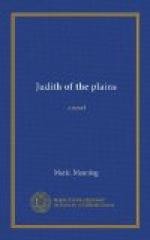She was by this time well down the divide. The temperature had risen perceptibly on the down grade. The heat of the plains had already mingled with the cool hill air; the heights, where Venus kept her love vigil, were already past. Judith gave Dolly a breathing spell, herself lounging easily meanwhile. She knew how to take her ease in the saddle as well as any cow-puncher on the range.
“The Hayoka has dominion over me,” she mused, with Indian fatalism. “As well resign myself to sorrow with dignity. Hayoka, Hayo—ka!” and she began to croon softly a hymn of propitiation to the Hayoka, the Sioux god of contrariety. According to the legends, he sat naked and fanned himself in a Dakota blizzard and huddled, shivering, over a fire in the heat of summer. Likewise the Hayoka cried for joy and laughed for sorrow.
She remembered how the nuns at Santa Fe had been shocked at her for praying to Indian gods, and how once she had built a little mound of stones, which was the Sioux way of making petition, in the shadow of the statue of the Virgin Mary, and how Sister Angela had scattered the stones and told her to pray instead to the Blessed Lady. She still prayed to the Blessed Lady every day; but sometimes, too, she reared little mounds of stones in the desert when she was very sad and the kinship between her and the dead gods of her mother’s people seemed the closer for their common sorrow.
Peter, coming up with a much-blown horse, found her still chanting the Indian song.
“Sing him a verse for me, Judith. Heaven knows I need something to straighten out my infernal luck. Tell the Hayoka that I’m a good fellow and need only half a chance. Tell him to prosper my present venture.”
She had begun to chant the invocation, then stopped suddenly. “I must not; you know I am a Catholic.” Suspicion that had been scotched, not killed, raised its head. “What was his present venture?” Her eye had not changed in expression, nor a tone of her voice, but in her heart was a sickening distrust for all things.
A belated moon had come up. The level plain, on which their horses threw grotesque, elongated shadows, was flooded with honey-colored light. Each straggling clump of sage-brush, whitening bone and bowlder, gleamed mysterious, ghostly in the radiant flood-tide. They seemed to be riding through a world that had no kinship with that black, formless void through which they had groped but yet a little while. Then darkness had been upon the face of the deep. Now there was a miracle of light such as only the




